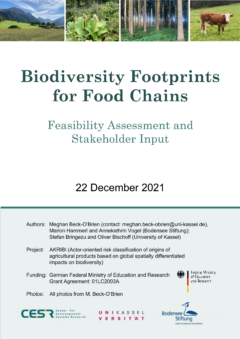Project
Actor-oriented risk classification of origins of agricultural products on the basis of globally spatially differentiated impacts on biodiversity (AKRIBI)
The project aimed to gather stakeholder needs and opinions on whether a monitoring approach based on a regional biodiversity risk assessment could be a useful tool for responsible food sourcing.
After reviewing studies, the report “Review of approaches to account for biodiversity in long-distance food supply chains: Focus on land use change and the production of crops” was published for stakeholders and policy makers. The linkages of food production to biodiversity impacts are presented and the following conclusions are drawn:
- Food systems are both dependent on biodiversity and a major factor in their loss
- Long supply chains shift the impact of production on biodiversity away from the consumer
- Changing practices to incorporate and conserve biodiversity can make a difference.
The key question was: How can best practices be applied on a larger scale and communicated to the client? The scope of different types of biodiversity monitoring measures was examined. It looked at how the measures can complement each other. Three approaches were discussed: Certification and standards, corporate policies and tools, and biodiversity footprints.
In three stakeholder workshops, these approaches were discussed with 46 representatives of food retailers, standards organizations, producer cooperatives, associations, government agencies, and scientific and environmental organizations.
Results: There is a clear desire to better incorporate biodiversity considerations into procurement practices. The food industry is currently inundated with a flood of labels. An additional approach should not add to the confusion. Incorporating biodiversity monitoring tools into existing systems would help promote acceptance and increase reliability and trust. A tool that allows retailers and food processing companies to better assess the sustainability of the places from which they source their raw materials by providing information on the biodiversity risks associated with purchasing from these regions would be valuable. Overall, a transformation of the food system is needed that includes biodiversity conservation at all levels and in all practices.
The results were summarized in a feasibility study: “Biodiversity Footprints for Food Chains: Feasibility Assessment and Stakeholder Input”.

